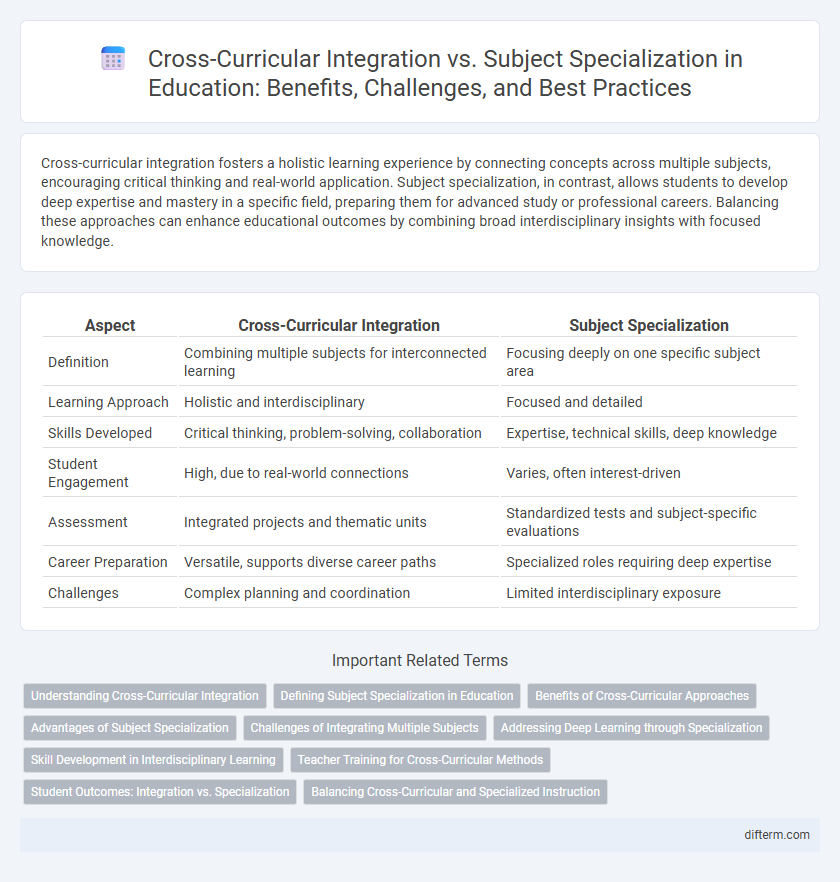Cross-curricular integration fosters a holistic learning experience by connecting concepts across multiple subjects, encouraging critical thinking and real-world application. Subject specialization, in contrast, allows students to develop deep expertise and mastery in a specific field, preparing them for advanced study or professional careers. Balancing these approaches can enhance educational outcomes by combining broad interdisciplinary insights with focused knowledge.
Table of Comparison
| Aspect | Cross-Curricular Integration | Subject Specialization |
|---|---|---|
| Definition | Combining multiple subjects for interconnected learning | Focusing deeply on one specific subject area |
| Learning Approach | Holistic and interdisciplinary | Focused and detailed |
| Skills Developed | Critical thinking, problem-solving, collaboration | Expertise, technical skills, deep knowledge |
| Student Engagement | High, due to real-world connections | Varies, often interest-driven |
| Assessment | Integrated projects and thematic units | Standardized tests and subject-specific evaluations |
| Career Preparation | Versatile, supports diverse career paths | Specialized roles requiring deep expertise |
| Challenges | Complex planning and coordination | Limited interdisciplinary exposure |
Understanding Cross-Curricular Integration
Cross-curricular integration enhances student learning by connecting concepts across multiple subjects, fostering critical thinking and real-world application. This approach contrasts with subject specialization, which emphasizes deep expertise in a singular discipline but may limit interdisciplinary understanding. Implementing cross-curricular strategies encourages collaboration among educators and develops holistic problem-solving skills essential for complex challenges.
Defining Subject Specialization in Education
Subject specialization in education refers to the focused study and teaching of a single academic discipline, allowing students and educators to deepen their expertise in that specific field. This approach emphasizes mastery of disciplinary content, critical thinking skills unique to the subject, and the development of advanced knowledge and methodologies related to the domain. Subject specialization supports academic rigor and prepares students for specialized careers or advanced study by fostering in-depth understanding and professional competence within the chosen area.
Benefits of Cross-Curricular Approaches
Cross-curricular integration enhances critical thinking and problem-solving by connecting concepts across subjects, fostering a deeper understanding and real-world application. This approach promotes collaboration, creativity, and adaptability, essential skills for the 21st-century learner, while encouraging students to draw meaningful links between disciplines. Evidence shows that students engaged in cross-curricular projects demonstrate higher retention rates and improved motivation compared to traditional subject specialization methods.
Advantages of Subject Specialization
Subject specialization enhances deep expertise, enabling students to master complex concepts within a specific discipline, which fosters higher academic performance and professional readiness. Focused knowledge in subjects like mathematics or biology supports advanced research and innovation by developing critical analytical skills tailored to the field. Specialized education also increases opportunities for career advancement in areas requiring specialized credentials or technical proficiency.
Challenges of Integrating Multiple Subjects
Integrating multiple subjects in education poses challenges such as curriculum alignment, varying teaching methodologies, and assessment consistency. Educators must navigate diverse content standards while ensuring depth of knowledge in each discipline. Time constraints and resource allocation also complicate effective interdisciplinary instruction.
Addressing Deep Learning through Specialization
Specialization in education fosters deep learning by allowing students to immerse themselves in specific subjects, leading to a profound understanding of complex concepts and mastery of advanced skills. Focused study enhances cognitive connections within a discipline, promoting critical thinking and expertise that broad cross-curricular approaches may dilute. Tailored curriculum design emphasizing subject specialization supports sustained intellectual growth and prepares learners for professional excellence in specialized fields.
Skill Development in Interdisciplinary Learning
Cross-curricular integration enhances skill development by fostering critical thinking, problem-solving, and adaptability through real-world applications across multiple disciplines. In contrast, subject specialization builds deep expertise and technical skills within a focused area of study. Interdisciplinary learning prioritizes collaboration, creativity, and communication competencies that prepare students for complex, multifaceted challenges in modern careers.
Teacher Training for Cross-Curricular Methods
Effective teacher training for cross-curricular methods equips educators with strategies to seamlessly integrate multiple subject areas, enhancing student engagement and deeper understanding. Emphasis on collaborative planning and interdisciplinary instructional design allows educators to create cohesive learning experiences that transcend isolated subject boundaries. Prioritizing professional development in cross-curricular approaches ensures teachers can foster critical thinking, problem-solving, and real-world application skills among students.
Student Outcomes: Integration vs. Specialization
Cross-curricular integration enhances student outcomes by promoting critical thinking, creativity, and real-world problem-solving skills through interconnected knowledge application. Subject specialization deepens expertise in specific disciplines, fostering advanced analytical skills and mastery essential for higher education and professional careers. Balanced educational approaches that combine integration and specialization optimize cognitive development and prepare students for diverse academic and career challenges.
Balancing Cross-Curricular and Specialized Instruction
Balancing cross-curricular integration with subject specialization enhances student learning by fostering interdisciplinary connections while maintaining deep expertise in core subjects. Integrating themes such as STEM with humanities encourages critical thinking and real-world problem-solving, whereas specialized instruction ensures mastery of foundational knowledge. Effective educational strategies employ a hybrid model that strategically aligns integrated projects with focused content to optimize cognitive development and academic achievement.
cross-curricular integration vs subject specialization Infographic

 difterm.com
difterm.com